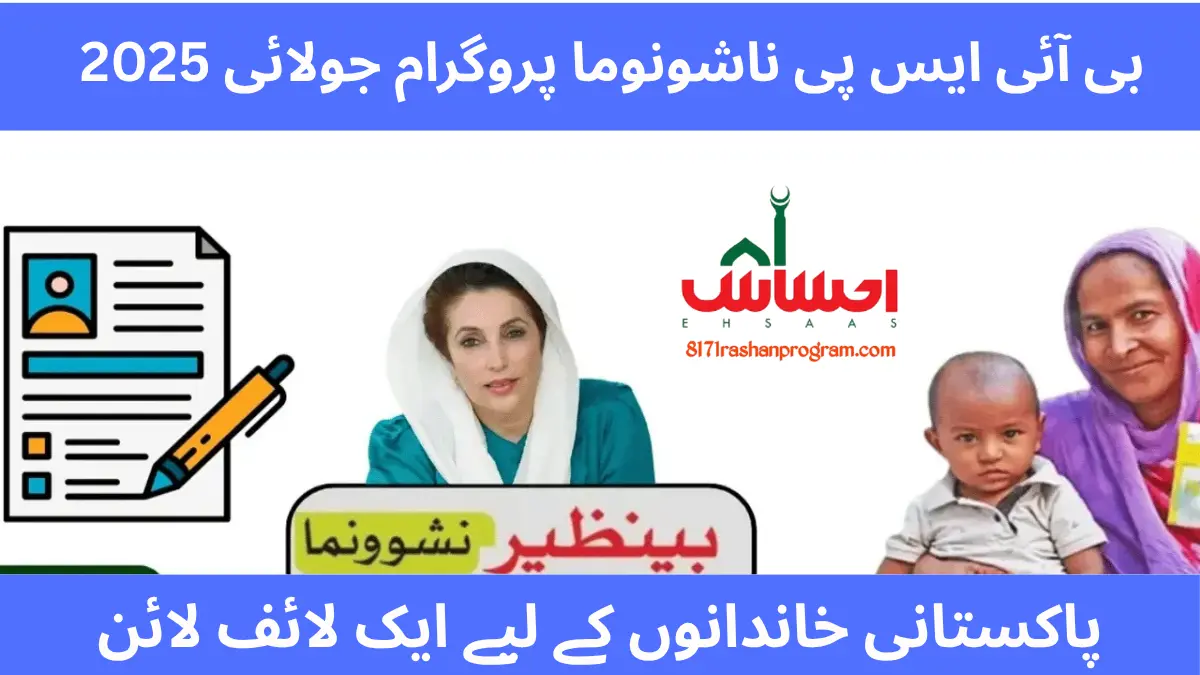The Benazir Income Support Programme (BISP Nashonuma Program) continues to be a crucial support system for low-income families across Pakistan. Among its most impactful initiatives is the Benazir Nashonuma Program, which provides vital cash stipends to improve the nutrition of pregnant women and young children. As of July 2025, the program has shown significant growth, yet it also faces ongoing challenges in ensuring smooth delivery and equitable coverage. Let’s delve into the latest updates, regional successes, payment hurdles, and what families can do to benefit fully.
Program Expansion and Its Impact in July 2025
July 2025 marked continued expansion for the Benazir Nashonuma initiative, with the total number of beneficiaries for the fiscal year surpassing 860,000. This impressive figure includes:
- Over 480,000 children under two years old
- More than 380,000 pregnant and breastfeeding women
This steady increase highlights improved awareness and access to the program. The dedicated BISP teams, working closely with health centers, have played a key role in registering new families through extensive field visits and public awareness campaigns.
How the Program Works:
Eligible families receive quarterly cash stipends designed to enhance the nutrition of both mothers and babies. The core objectives of this program are to:
- Reduce stunting and malnutrition among young children.
- Support pregnant women by encouraging prenatal care.
- Promote regular health checkups for mothers and children.
- Provide financial assistance for better food and healthcare access.
Uneven Regional Coverage: Who Benefits Most?
While the overall numbers are encouraging, the reach of the program varies significantly across Pakistan.
High-Coverage Regions:
Punjab and Sindh consistently show high enrollment rates. This is largely due to a more robust network of healthcare centers and greater public awareness initiatives in these provinces. Urban areas, especially in major cities, also experience more consistent payment delivery and easier access to services.
Low-Coverage Regions:
Conversely, Balochistan, parts of Khyber Pakhtunkhwa (KP), and remote northern districts face considerable challenges. Many families in these areas remain unregistered because of:
- Poor access to clinics
- Long travel distances
- Limited awareness about the program
- Connectivity and documentation issues, leading to delays in enrollment and payments.
This disparity means that thousands of vulnerable children and mothers in remote areas are still missing out on this critical support.
Navigating Payment Delays and Backlogs
Despite the growing number of beneficiaries, some families experienced payment delays in July.
Common Causes for Delays:
Several factors contributed to these payment backlogs:
- Incorrect or unverified CNIC numbers: Discrepancies in national identity card details.
- Families flagged as tax filers: New filters designed to prevent fraud sometimes incorrectly identify eligible families.
- Incomplete health checkup records: Especially crucial for pregnant women.
- Missed biometric verification or SIM verification issues.
- Bank account mismatches or inactive mobile numbers.
In many instances, once these issues were resolved, families received both their current and past payments together. However, some still faced weeks of waiting beyond the usual payment window.
Major Hurdles in Program Delivery
The Nashonuma program, while impactful, continues to grapple with several persistent challenges:
- Lack of Awareness: Many families, particularly in rural areas, are unaware of:
- Their eligibility for the program.
- How to apply.
- Where to go for verification.
- Required documents.
- Payment schedules. This knowledge gap often leads to missed opportunities and delays in receiving aid.
- Strict Filters: To combat fraud, the government employs strict filters. Unfortunately, these can sometimes block deserving families due to:
- Mistakes in NADRA data.
- Incorrect tax filing status.
- Outdated SIM cards or inactive mobile numbers. Without proper assistance, these families often fall through the cracks.
- Infrastructure Gaps: Many regions lack essential infrastructure, including:
- Basic health clinics.
- Mobile registration vans.
- Biometric scanners.
- Stable internet or electricity. These deficiencies significantly slow down the entire process and make it difficult for families to meet program requirements.
Common Questions About BISP Nashonuma Stipends (FAQs)
Here are answers to some frequently asked questions about BISP’s child nutrition stipends:
- How do I apply for Nashonuma stipends? Visit your nearest BISP office or designated health center. Bring your CNIC, pregnancy card (if applicable), or your child’s B-form. You may need to fill out a short form, attend a health session, and complete mobile number and biometric verification.
- When are the payments given? Payments are typically released every three months, though exact dates can vary by region. In July 2025, most beneficiaries started receiving payments by mid-month, but some faced technical delays.
- Why didn’t I get my payment? Possible reasons for delayed payments include:
- Mismatch in your CNIC or biometric data.
- Being incorrectly flagged as a tax-filer.
- Missing required health visits or child checkups.
- Inactive mobile number or blocked SIM. It’s best to contact your local BISP office to determine the exact reason.
- How much is the stipend? The stipend amounts are:
- Pregnant women and breastfeeding mothers: PKR 2,000 per quarter
- Children under two years old:
- PKR 2,000 for boys
- PKR 2,500 for girls These amounts are intended to help families purchase better food, vitamins, and essential baby care items.
Solutions and Recommendations for a Stronger Program
To enhance the Nashonuma program and minimize payment delays, here are key recommendations:
- Increase mobile registration vans in remote and underserved areas.
- Improve data sharing between BISP, NADRA, and FBR to reduce false disqualifications.
- Utilize local radio and SMS alerts to keep families informed about payment timelines.
- Translate program messages into local languages to improve understanding and outreach.
- Establish dedicated complaint booths at health centers for faster issue resolution.
For Families:
- Keep your CNIC and SIM active and registered in your name.
- Attend all health sessions and bring all required documents.
- Regularly ask your local health worker for program updates.
- If your payment is delayed, visit your local BISP office immediately – don’t wait.
FAQs about the BISP Nashonuma Program
1. What is the Benazir Nashonuma Program?
The Benazir Nashonuma Program is an initiative by the Benazir Income Support Programme (BISP) that provides cash stipends to improve the nutrition of pregnant women and young children (under two years old) in low-income families across Pakistan. Its goal is to reduce stunting and malnutrition, encourage prenatal care, support health checkups, and provide financial aid for better food and health access.
2. Who is eligible for Nashonuma stipends?
The program primarily targets:
Pregnant women.
Breastfeeding mothers.
Mothers of children under two years old. Eligible families must generally belong to low-income households, and specific criteria are assessed through a survey (Poverty Scorecard) and health checks.
3. How do I apply for Nashonuma stipends?
To apply, visit your nearest BISP office or a designated health center (such as a Basic Health Unit or Rural Health Center). You will need your original CNIC, your pregnancy card (if pregnant), or your child’s B-form. You may be required to fill out a form, attend a health session, and complete mobile number and biometric verification. Lady Health Visitors (LHVs) often assist with registration at public health facilities.
4. When are the payments given?
Payments are typically released every three months (quarterly). While exact dates can vary by region, in July 2025, most beneficiaries started receiving payments by mid-month. However, some delays due to technical issues can occur.
5. How much is the stipend?
As of July 2025, the quarterly stipend amounts are:
Pregnant women and breastfeeding mothers: PKR 2,000 per quarter
Children under two years old:
PKR 2,000 for boys
PKR 2,500 for girls These amounts are intended to help families purchase nutritious food, vitamins, and baby care items.
6. Why didn’t I receive my payment?
Several reasons can cause payment delays or non-receipt:
Incorrect or unverified CNIC numbers: Your National Identity Card details might have issues.
Flagged as a tax-filer: Sometimes, filters designed to prevent fraud can mistakenly block eligible families.
Incomplete health checkup records: This is particularly important for pregnant women.
Missed biometric verification or SIM verification issues.
Bank account mismatches or inactive mobile numbers.
Skipped the mandatory re-survey (if you’ve been receiving BISP payments for three years or more). If you face issues, contact your local BISP office or the BISP helpline (0800-26477) to find out the exact reason and resolve it.
7. How can I check my payment status?
You can check your payment status through:
SMS: Send your 13-digit CNIC number (without dashes) to 8171. You will receive a reply about your eligibility and payment status.
Online Portal: Visit the official BISP 8171 web portal, enter your CNIC number and the captcha code, then click submit.
BISP Tehsil Office: Visit your nearest BISP office in person for assistance.
8. What should I do if my biometric verification fails? If your fingerprint isn’t working at the payment center or ATM, first try cleaning your thumb and trying again. If it persists, visit a NADRA office to update your biometric data. Once updated, try again at the payment center. If issues continue, visit a BISP Tehsil office; they may be able to process your payment manually.
8. What should I do if my biometric verification fails?
If your fingerprint isn’t working at the payment center or ATM, first try cleaning your thumb and trying again. If it persists, visit a NADRA office to update your biometric data. Once updated, try again at the payment center. If issues continue, visit a BISP Tehsil office; they may be able to process your payment manually.
9. What are the major challenges faced by the program?
Key challenges include:
Lack of Awareness: Many families, especially in rural areas, don’t know about their eligibility or how to apply.
Strict Filters: While intended to prevent fraud, these can sometimes disqualify deserving families due to data errors.
Infrastructure Gaps: Remote areas may lack basic health clinics, mobile registration vans, or reliable internet/electricity, hindering the process.
10. What can families do to ensure they stay eligible and receive payments smoothly?
Keep your CNIC and SIM active and registered in your name.
Attend all required health sessions and bring all necessary documents.
Regularly ask your local health worker for program updates.
If your payment is delayed, visit the BISP office immediately to resolve any issues.
Only trust official BISP channels (8171 SMS, official web portal, BISP offices, and helpline 0800-26477) and never pay any fees to apply or receive payments.
Conclusion
BISP Nashonuma Program is a powerful tool in Pakistan’s fight against malnutrition. With continued commitment to addressing its operational challenges and fostering greater collaboration, it can truly transform the health and well-being of countless mothers and children, paving the way for a healthier, more resilient future for the nation.
Disclaimer:
This article provides information based on the publicly available details and trends concerning the BISP Nashonuma Program as of July 2025. While every effort has been made to ensure accuracy and provide helpful guidance, program details, eligibility criteria, payment schedules, and operational procedures are subject to change by the Benazir Income Support Programme (BISP) and the Government of Pakistan.
Readers are strongly advised to:
- Verify all information directly with official BISP sources, such as their nearest BISP Tehsil Office, the official BISP website (www.bisp.gov.pk), or the BISP helpline (0800-26477).
- Not rely solely on this article for critical decisions regarding their eligibility or payments.
- Be cautious of fraudulent activities; BISP never asks for money or personal details over the phone or through unofficial channels for registration or payments. Always use the official 8171 SMS service for verification.
This article is for informational purposes only and does not constitute official advice or endorsement from BISP. The authors and publishers are not responsible for any inaccuracies, omissions, or consequences arising from the use of this information.

Rana Shahriyar is a dedicated content writer and contributor at 8171 Rashan Program. With a strong interest in social welfare programs and government initiatives, his work focuses on delivering clear, reliable, and easy to understand information for the public.
